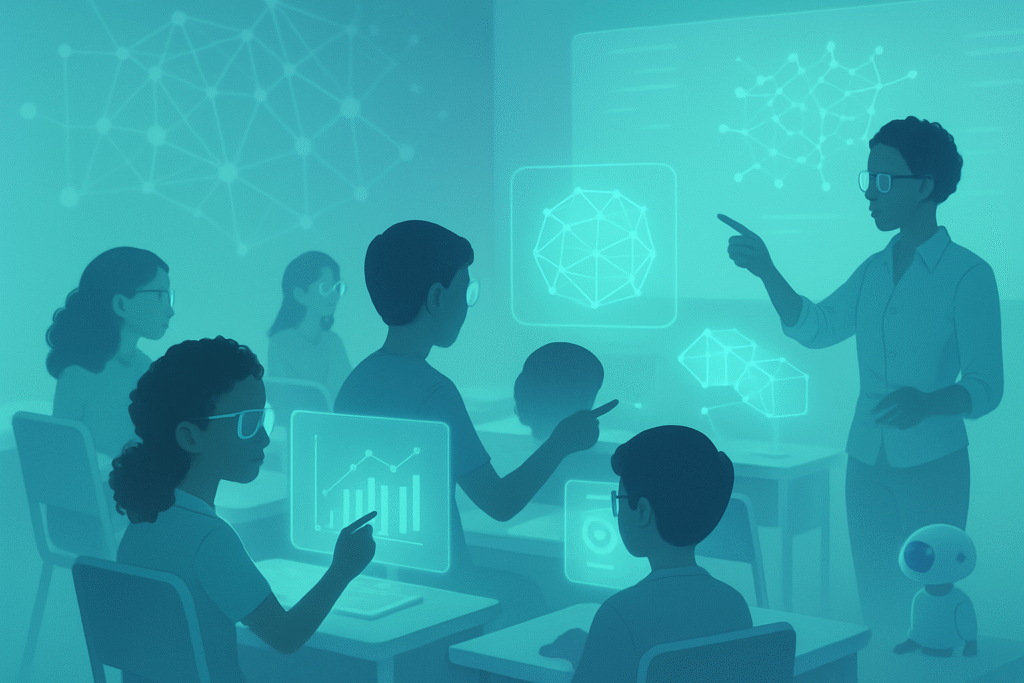Financial News
Boston Pioneers AI Integration in Classrooms, Setting a National Precedent

Boston Public Schools (BPS) is at the vanguard of a transformative educational shift, embarking on an ambitious initiative to embed artificial intelligence into its classrooms. This pioneering effort, part of a broader Massachusetts statewide push, aims to revolutionize learning experiences by leveraging AI for personalized instruction, administrative efficiency, and critical skill development. With a semester-long AI curriculum rolling out in August 2025 and comprehensive guidelines already in place, Boston is not just adopting new technology; it is actively shaping the future of AI literacy and responsible AI use in K-12 education, poised to serve as a national model for school systems grappling with the rapid evolution of artificial intelligence.
The initiative's immediate significance lies in its holistic approach. Instead of merely introducing AI tools, Boston is developing a foundational understanding of AI for students and educators alike, emphasizing ethical considerations and critical evaluation from the outset. This proactive stance positions Boston as a key player in defining how the next generation will interact with, understand, and ultimately innovate with AI, addressing both the immense potential and inherent challenges of this powerful technology.
A Deep Dive into Boston's AI Educational Framework
Boston's AI in classrooms initiative is characterized by several key programs and a deliberate focus on comprehensive integration. Central to this effort is a semester-long "Principles of Artificial Intelligence" curriculum, designed for students in grades 8 and up. This course, developed in partnership with Project Lead The Way (PLTW), introduces foundational AI concepts, technologies, and their societal implications through hands-on, project-based learning, notably requiring no prior computer science experience. This approach democratizes access to AI education, moving beyond specialized tracks to ensure broad student exposure.
Complementing the curriculum is the "Future Ready: AI in the Classroom" pilot program, which provides crucial professional development for educators. This program, which supported 45 educators across 30 districts and reached approximately 1600 students in its first year, is vital for equipping teachers with the confidence and skills needed to effectively integrate AI into their pedagogy. Furthermore, the BPS AI Guidelines, revised in Spring and Summer 2025, provide a responsible framework for AI use, prioritizing equity, access, and student data privacy. These guidelines explicitly state that AI will not replace human educators, but rather augment their capabilities, evolving the teacher's role into a facilitator of AI-curated content. Specific AI technologies being explored or piloted include AI chatbots and tutors for personalized learning, Character.AI for interactive historical simulations, and Class Companion for instant writing feedback. Generative AI tools such as ChatGPT (backed by Microsoft (NASDAQ: MSFT)), Sora, and DALL-E are also part of the exploration, with Boston University even offering premium ChatGPT subscriptions for some interactive media classes, showcasing a "critical embrace" of these powerful tools. This differs significantly from previous technology integrations, which often focused on productivity tools or basic coding. Boston's initiative delves into the principles and implications of AI, preparing students not just as users, but as informed citizens and potential innovators. Initial reactions from the AI research community are largely positive but cautious. Experts like MIT Professor Eric Klopfer emphasize AI's benefits for language learning and addressing learning loss, while also warning about inherent biases in AI systems. Professor Nermeen Dashoush of Boston University's Wheelock College of Education and Human Development views AI's emergence as "a really big deal," advocating for faster adoption and investment in professional development.
Competitive Landscape and Corporate Implications
Boston's bold move into AI education carries significant implications for AI companies, tech giants, and startups. Companies specializing in educational AI platforms, curriculum development, and professional development stand to gain substantially. Providers of AI curriculum solutions, like Project Lead The Way (PLTW), are direct beneficiaries, as their frameworks become integral to large-scale school initiatives. Similarly, companies offering specialized AI tools for classrooms, such as Character.AI (a private company), which facilitates interactive learning with simulated historical figures, and Class Companion (a private company), which provides instant writing feedback, could see increased adoption and market penetration as more districts follow Boston's lead.
Tech giants with significant AI research and development arms, such as Microsoft (NASDAQ: MSFT) (investor in OpenAI, maker of ChatGPT) and Alphabet (NASDAQ: GOOGL) (developer of Bard/Gemini), are positioned to influence and benefit from this trend. Their generative AI models are being explored for various educational applications, from brainstorming to content generation. This could lead to increased demand for their educational versions or integrations, potentially disrupting traditional educational software markets. Startups focused on AI ethics, data privacy, and bias detection in educational contexts will also find a fertile ground for their solutions, as schools prioritize responsible AI implementation. The competitive landscape will likely intensify as more companies vie to provide compliant, effective, and ethically sound AI tools tailored for K-12 education. This initiative could set new standards for what constitutes an "AI-ready" educational product, pushing companies to innovate not just on capability, but also on pedagogical integration, data security, and ethical alignment.
Broader Significance and Societal Impact
Boston's AI initiative is a critical development within the broader AI landscape, signaling a maturation of AI integration beyond specialized tech sectors into fundamental public services like education. It reflects a growing global trend towards prioritizing AI literacy, not just for future technologists, but for all citizens. This initiative fits into a narrative where AI is no longer a distant future concept but an immediate reality demanding thoughtful integration into daily life and learning. The impacts are multifaceted: on one hand, it promises to democratize personalized learning, potentially closing achievement gaps by tailoring education to individual student needs. On the other, it raises profound questions about equity of access to these advanced tools, the perpetuation of algorithmic bias, and the safeguarding of student data privacy.
The emphasis on critical AI literacy—teaching students to question, verify, and understand the limitations of AI—is a vital response to the proliferation of misinformation and deepfakes. This proactive approach aims to equip students with the discernment necessary to navigate a world increasingly saturated with AI-generated content. Compared to previous educational technology milestones, such as the introduction of personal computers or the internet into classrooms, AI integration presents a unique challenge due to its autonomous capabilities and potential for subtle, embedded biases. While previous technologies were primarily tools for information access or productivity, AI can actively shape the learning process, making the ethical considerations and pedagogical frameworks paramount. The initiative's focus on human oversight and not replacing teachers is a crucial distinction, attempting to harness AI's power without diminishing the invaluable role of human educators.
The Horizon: Future Developments and Challenges
Looking ahead, Boston's AI initiative is expected to evolve rapidly, driving both near-term and long-term developments in educational AI. In the near term, we can anticipate the expansion of pilot programs, refinement of the "Principles of Artificial Intelligence" curriculum based on initial feedback, and increased professional development opportunities for educators across more schools. The BPS AI Guidelines will likely undergo further iterations to keep pace with the fast-evolving AI landscape and address new challenges as they emerge. We may also see the integration of more sophisticated AI tools, moving beyond basic chatbots to advanced adaptive learning platforms that can dynamically adjust entire curricula based on real-time student performance and learning styles.
Potential applications on the horizon include AI-powered tools for creating highly individualized learning paths for students with diverse needs, advanced language learning assistants, and AI systems that can help identify learning difficulties or giftedness earlier. However, significant challenges remain. Foremost among these is the continuous need for robust teacher training and ongoing support; many educators still feel unprepared, and sustained investment in professional development is critical. Ensuring equitable access to high-speed internet and necessary hardware in all schools, especially those in underserved communities, will also be paramount to prevent widening digital divides. Policy updates will be an ongoing necessity, particularly concerning student data privacy, intellectual property of AI-generated content, and the ethical use of predictive AI in student assessment. Experts predict that the next phase will involve a deeper integration of AI into assessment and personalized content generation, moving from supplementary tools to core components of the learning ecosystem. The emphasis will remain on ensuring that AI serves to augment human potential rather than replace it, fostering a generation of critical, ethical, and AI-literate individuals.
A Blueprint for the AI-Powered Classroom
Boston's initiative to integrate artificial intelligence into its classrooms stands as a monumental step in the history of educational technology. By prioritizing a comprehensive curriculum, extensive teacher training, and robust ethical guidelines, Boston is not merely adopting AI; it is forging a blueprint for its responsible and effective integration into K-12 education globally. The key takeaways underscore a balanced approach: embracing AI's potential for personalized learning and administrative efficiency, while proactively addressing concerns around data privacy, bias, and academic integrity. This initiative's significance lies in its potential to shape a generation of students who are not only fluent in AI but also critically aware of its capabilities and limitations.
The long-term impact of this development could be profound, influencing how educational systems worldwide prepare students for an AI-driven future. It sets a precedent for how public education can adapt to rapid technological change, emphasizing literacy and ethical considerations alongside technical proficiency. In the coming weeks and months, all eyes will be on Boston's pilot programs, curriculum effectiveness, and the ongoing evolution of its AI guidelines. The success of this endeavor will offer invaluable lessons for other school districts and nations, demonstrating how to cultivate responsible AI citizens and innovators. As AI continues its relentless march into every facet of society, Boston's classrooms are becoming the proving ground for a new era of learning.
This content is intended for informational purposes only and represents analysis of current AI developments.
TokenRing AI delivers enterprise-grade solutions for multi-agent AI workflow orchestration, AI-powered development tools, and seamless remote collaboration platforms.
For more information, visit https://www.tokenring.ai/.
More News
View More




Recent Quotes
View More
Quotes delayed at least 20 minutes.
By accessing this page, you agree to the Privacy Policy and Terms Of Service.



